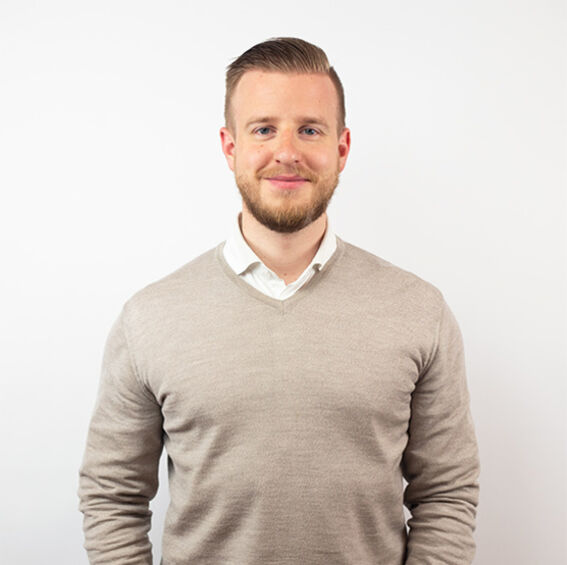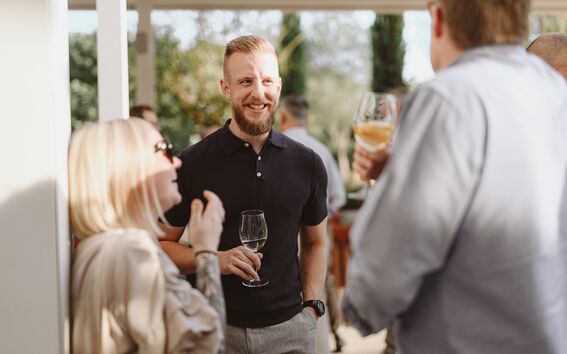School of Business alumni stories
Here you can find School of Business alumni stories. Our alumni share their professional journeys and give advice and tips regarding working life. The stories have been sorted based on the alumni's majors.

Paananen completed his bachelor's studies in Mikkeli. 'I was interested in commerce and management. In fact, I had bought the entrance exam books for applying to the bachelor's studies in Töölö as well, but I didn't feel like reading them and trusted that I would get into Mikkeli directly with my matriculation certificate. I had also heard that there is a very close-knit community in Mikkeli. When I was in high school, a student who had started their studies in Mikkeli came to talk to us, and this also encouraged me to apply,' he says.
Paananen says that he found the bachelor's studies in Mikkeli to be good general-level studies, but he longed for more analytical aspects in the studies. He was interested in structuring things, numbers and managing people, so he wanted to pursue master's level studies. 'At the time when I graduated from the bachelor's level in Mikkeli, one still had to apply separately to the master's programme in Töölö. I applied and got into the strategy major, which includes part of the studies from the department of industrial engineering and management, so the studies involved a lot of commuting between Töölö and Otaniemi campuses. I studied finance as a minor and graduated as a master in 2015,' Paananen recounts.
When asked about his study experience, Paananen talks about the close-knit community in Mikkeli and the continued connection with friends after the studies: 'It was amazing to study in Mikkeli and we built a really tight-knit community. I found my spouse there, and we still spend Midsummer every year with the same group of friends. Many have had children and we are all involved, adults and children together.'
Paananen praises the study model in Mikkeli, where many group works further strengthened the community and where Finnish and foreign professors brought new perspectives to the course contents. 'I made lifelong friends there: I am the godfather of one child, the key people of two founded companies were found during the studies and so on. It's funny to think in retrospect how many paths lead back to studies,' Paananen says.

While studying at the master's level, Paananen was already working simultaneously, so the experience of the studies has remained somewhat distant. 'I didn't know many people from the courses, and many were already following their own paths, balancing between studies and work.'
'However, the quality of teaching at both the bachelor's and master's level was really good and professional. In master's studies, it was necessary to take more responsibility for the progress of one's own studies, which is, of course, beneficial for both working life and learning. The most challenging aspect at the master's level was coordinating work and studies, as well as writing the master's thesis.'
'I remember how I wrote the thesis one summer in the sauna cottage at my grandparents' place, because I knew that when autumn came, I would be so caught up in various projects due to consulting work that I had to complete it during that summer. And that's how it got finished,' Paananen recalls.
As the most important skills that he learned during his studies, Paananen lists the ability to present things to others and the understanding that in selling, all emotions, fears, and all kinds of thoughts come along. ‘Additionally, I would highlight the understanding of the big picture, prioritising tasks, and working as a team – these have been important lessons. No one does things in silos.’
‘I wouldn't change anything in my studies. If I were to do something more, I would act as a support person for exchange students coming to Aalto from elsewhere. When I was on exchange in Mexico during my bachelor's studies, I realised how significant the support from local students was in my own integration into studies in a foreign country and culture.’
‘I have been interested in investing and generating passive income since primary school. The market lacked an investor-friendly investment product, so I founded a real estate investment company Tamado Investment together with three close friends at the age of 23, in between my bachelor’s and master’s studies, during one summer. Over the years, it taught me a lot about starting and growing a company.’ The company still exists but does not employ Paananen full-time. There are four of them managing the company, and the work practically includes portfolio management and raising funds from banks and investors.
‘Although all kinds of business-related problems greatly interested me, I swore when applying for entry-level jobs during my studies that I would never work in a management consulting firm. However, I stumbled upon a small strategic consulting company, Capful, which was looking for business analysts, and I decided to apply for the position,’ Paananen recalls.
He says that the company had a small team and very professional workers, and he thought that it would offer a lot of responsibility and quick learning. This also seemed like a logical transition from strategy studies to working life. Combining studies and work was easy, and Paananen worked part-time until the end of his master’s studies.
‘After working at the consulting firm for a while, I did not feel like I was in the right place. I wanted to do more concrete things. I had previously gotten acquainted with Anders von Bonsdorff, who was a professional board member and private investor. I asked him directly if he needed help and told him what I could do. I then started acting as his “right-hand man”, searching for new investment opportunities and analysing them.’
Then we realised together that we practically knew nothing about these firms as we were not involved at the operational level. That’s where the idea of developing a more systematic way to help the CEOs of SMEs came from. We wanted to help them better understand their own company, how it was doing and communicate this effectively – thus Aamu Partners was born,’ Paananen explains. Initially, there were five founders involved, and Paananen himself has served as CEO since the establishment. Now, two months ago, they hired an external CEO for Aamu, and Paananen moved to the board.

In addition, I am involved with the physiotherapy and coaching company Ideal Health as an owner and providing guidance,' says Paananen. Another noteworthy involvement for Paananen is with CEO CF (Collaboration Forum), which is a peer support network for European entrepreneurs, where all discussions are completely confidential. The network has a total of 60–70 members, and Paananen says he joined about three years ago at the invitation of von Bonsdorff.
'Entrepreneurs often try to manage things on their own and many lack a neutral party with whom to brainstorm. Additionally, the role of a CEO can be quite lonely, and this network provides a diverse and close-knit peer group. Members of the network come as themselves, completely open, because that's the only way someone can help you. The network meets about three times a year, always at a specific location,' Paananen explains.
'Often, the issues and challenges we discuss are similar regardless of the company's size or industry, and it is great to be helping a CEO from a completely different sector. It has been wonderful to find a suitable peer support network where you can bounce ideas around and that helps you see things you wouldn't see yourself.'
Currently, Paananen is back as Anders von Bonsdorff's right-hand man, and they support other Finnish and European entrepreneurs as entrepreneurs themselves. 'My days are spent on board and advisory work, various funding negotiations, strategy work, and corporate arrangements. I'm still involved in all three aforementioned companies, i.e. Tamado, Aamu, and Ideal Health.'
Reflecting back on his own studies and the skills learned, Paananen believes that among the most important skills required in entrepreneurship are selling and tolerating uncertainty. 'An entrepreneur needs to be able to sell their idea to the first people who would want to join and invest in the idea. Commercial selling also needs to be considered. Finland is full of companies with excellent ideas, but they lack the commercial side. It's really sad, and there's much to improve on at the societal level. It's talked about a lot, but more should be done.'
'Secondly, I have a high tolerance for uncertainty, which is quite necessary. During our studies, we invested our student loans in a real estate investment company, and we had to accept the fact that we didn't know for certain how it would turn out. In today's world, all changes are directly reflected in the activities of companies. Coronavirus, war in Ukraine, energy crisis, component shortage, inflation and rising interest rates have all affected Aamu Partners and also strongly our customers. That has really measured the capacity to tolerate uncertainty.'
'The most important thing, however, is to find your own thing that you are good at, and then you can gather a team around you where everyone is good at something. Dare to trust your own thing and also, on the other hand, others' expertise,' Paananen sums up.
Get to know Tuomas more on LinkedIn!

Here you can find School of Business alumni stories. Our alumni share their professional journeys and give advice and tips regarding working life. The stories have been sorted based on the alumni's majors.

Get the tools to lead sustainable business ventures – and join the race to solve some of the world’s most urgent problems!



